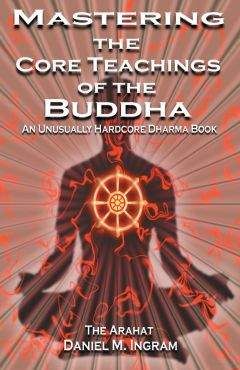Daniel Ingram - Mastering the Core Teachings of Buddha - An Unusually Hardcore Dharma Book
На сайте mybooks.club вы можете бесплатно читать книги онлайн без регистрации, включая Daniel Ingram - Mastering the Core Teachings of Buddha - An Unusually Hardcore Dharma Book. Жанр: Прочее издательство -,. Доступна полная версия книги с кратким содержанием для предварительного ознакомления, аннотацией (предисловием), рецензиями от других читателей и их экспертным мнением.
Кроме того, на сайте mybooks.club вы найдете множество новинок, которые стоит прочитать.

Daniel Ingram - Mastering the Core Teachings of Buddha - An Unusually Hardcore Dharma Book краткое содержание
Mastering the Core Teachings of Buddha - An Unusually Hardcore Dharma Book читать онлайн бесплатно
He was a bit farther along than I was in his spiritual crisis, and finally he had no choice but to give it a try. He quit the music business, moved back to California, and lived in a run down old mobile home, driving pizza to save money so that he could go off on a spiritual quest. He finally did some intensive meditation retreats and then eventually took off to Asia for a year of intensive practice under the guidance of meditation masters in the Burmese Theravada Buddhist tradition.
When he came back, the benefits of his practice were obvious, and a few years later I began to try to follow a similar path.
In 1994, I began going on intensive meditation retreats and doing a lot of daily practice. I also ran into some very odd and interesting experiences, and began to look around for more guidance on how to proceed and keep things in perspective. Good teachers were few and far iv
Foreword and Warning
away, their time limited and often expensive to obtain, and their answers to my questions were often guarded and cryptic. Even my old music friend was keeping most of what he knew to himself, and issues around disclosure of meditation theory and personal practice details nearly cost us our friendship.
Frustrated, I turned to books, reading extensively, poring over texts both modern and ancient looking for conceptual frameworks that might help me navigate skillfully in territory that was completely outside my previous experience. Despite having access to an astounding number of great and detailed dharma books, I found that they left out lots of details that turned out to be very important. I learned the hard way that using conceptual frameworks that were too idealistic or that were not fully explained could be as bad as using none at all. Further, I found that much of the theory about progress contained ideals and myths that simply did not hold up to reality testing, as much as I wanted them to.
I also came to the profound realization that they have actually worked all of this stuff out. Those darn Buddhists have come up with very simple techniques that lead directly to remarkable results if you follow instructions and get the dose high enough. While some people don’t like this sort of cookbook approach to meditation, I am so grateful for their recipes that words fail to express my profound gratitude for the successes they have afforded me.
Their simple and ancient practices revealed more and more of what I sought. I found my experiences filling in the gaps in the texts and teachings, debunking the myths that pervade the standard Buddhist dogma and revealing the secrets meditation teachers routinely keep to themselves. Finally, I came to a place where I felt comfortable writing the book that I had been looking for, the book you now hold in your hands.
This book is for those who really want to master the core teachings of the Buddha and who are willing to put in the time and effort required. It is also for those who are tired of having to decipher the code of modern and ancient dharma books, as it is designed to be honest, explicit, straightforward and rigorously technical. Like many of the commentaries on the Pali Canon, it is organized along the lines of v
Foreword and Warning
the three basic trainings that the Buddha taught: morality, concentration and wisdom.
Throughout this book I have tried to be as utilitarian and pragmatic as possible, and the emphasis is always on how to actually “get it” at the level that makes some difference. All sections also assume to some degree that you have a practice of some sort, hang out in some sort of spiritual scene, and know a bit of the standard dharma lingo. All sections also assume that you are willing to do the work.
I have tried to include enough information to make this book capable of standing on its own as a manual of meditation and for walking the spiritual path. However, I have also tried to focus on those areas that I consider to be my core competencies and also those areas of the spiritual path that I do not feel have been adequately covered in the works that have come before this one. This book shines in areas of technique and the fine points of very high-level practice. However, the spiritual life is vast beyond measure and cannot possibly be adequately covered in a single book. Thus, I will often refer you to other excellent sources for more details on those topics that I feel have already been covered quite well by other authors. I strongly suggest checking out at least some if not all of these other sources.
Like my own practice, this book is heavily influenced by the teachings of the late, great Mahasi Sayadaw, a Burmese meditation master and scholar in the Theravada Buddhist tradition, and by those in his lineage and outside it. There are numerous references to other excellent traditions as well, some Buddhist and some not. It is my sincere wish that all diligent students of meditation find something in this book that is of practical value to them.
I have included a few of my own experiences and labeled them as such. This is done to try to add some sense of the reality of what is possible, both in terms of successes and failures. They should add a human dimension to the theory. However, if you find that these stories get in the way, or if they seem to have too much of the quality of “let me tell you about my personal spiritual quest,” please do us both a favor and skip over them without a second thought.
I have also written this book in what is clearly my own voice. Those who have read this work who know me tell me that they can almost hear vi
Foreword and Warning
me saying it. I have also left in a lot of my neurotic stuff and made it as obvious as I can. I will assert that anyone who writes puts their stuff in there even if they try to hide it, so at least you should be able to see it clearly rather than it being hidden and covert. If you want a book that is just the straight dogma and theory without this sort of voice, there are lots to choose from and I will mention a number along the way.
I have also included a modicum of social commentary, some of which has a definite bite to it. Some of you may not find it helpful, or even find it quite distasteful and offensive. Some of you will quickly dismiss it as harsh or wrong speech. I am torn between the feeling that there really are some important points in those sections and the understanding that not everyone will be able to make good use of information and opinions presented in such strong terms. Thus, I ask you to please skip over those chapters and get to the friendlier or more technical sections beyond them if you don’t find them helpful. To facilitate doing so, I have included a star (asterisk) in the titles of those chapters that contain potentially inflammatory material so that they may be treated appropriately.
While I feel that the points made in those chapters are important and potentially quite valid and useful, they are not absolutely necessary for understanding the chapters that follow them. The world is brimming with very nice and friendly dharma books. There are hundreds available on the shelves of any mega-bookstore. However, I believe that there is room for a book that sometimes conveys its message in a very different voice, though I respectfully give you the option to choose how much of that voice you want to hear. It is the unrestrained voice of one from a generation whose radicals wore spikes and combat boots rather than beads and sandals, listened to the Sex Pistols rather than the Moody Blues, wouldn’t know a beat poet or early ‘60s dharma bum from a hole in the ground, and thought the hippies were pretty friggin’ naïve, not that we don't owe them a lot. It is also the unrestrained voice of one whose practice has been dedicated to complete and unexcelled mastery of the traditional and hardcore stages of the path rather than some sort of vapid New Age fluff or pop psychological head-trip. If that ain’t you, consider reading something else.
vii
Foreword and Warning
As a highly regarded senior meditation teacher and scholar (who will remain anonymous) said to me after skimming through an earlier draft of this book, “Most Buddhists are just aging Boomers who want to do something to feel better about themselves as they get older and are not really interested in this sort of thing.” I wish them great success in getting those valid needs met and so I must reluctantly advise such individuals to avoid reading this book or at least the chapters marked with a star.
This is simultaneously an admission of the limitations of this work, an invitation to adopt a more empowering view of what is possible on the spiritual path, and a warning.
I have had other motivations for writing this book. A number of people have attempted to have me be their meditation teacher. I have done what I can to encourage them to practice well, go on retreats and explore, but as soon as I get the sense that they are not into really doing the work or are trying to idolize me in even small ways, I go out of my way to alienate them completely. I greatly prefer the company of fellow adventurers who wish to explore the mysteries of this life together than any other sort of relationship. Dharma friends may be at different stages in the practice and one friend may teach another something useful, but this has a very different feel from people who are formally teacher and student. Thus, writing this book allows me to hand them the better part of what I know and say, “Here, if you are really into it, there is more than enough here to allow you to plunge as deep as you care to. If not, I have wasted little of my time and can avoid being put on some strange pedestal or pillory, at least to my face.”
That said, I do have the explicit goal of facilitating others to become living masters of this material that they may go forth and help to encourage more people to do so. The more people are able to teach from a place of deeply established personal experience, the more people will be able to learn the dharma well, and the saner and happier the world will be.
This brings me to the question of the issue of what some would call hierarchy. The simple fact is that there are those that have attained to what is called awakening, enlightenment, realization, etc. and those that haven't. There are those with strong concentration abilities and those those without. There are those who have their morality trip together and viii
Foreword and Warning
those that don't. There are those who are masters of some things and those that have more work to do. While there is a strangely pervasive movement in the West to try to imagine everyone is equal in the world of spirituality, it is obviously completely delusional and wrong-headed.
When I went looking for teachers and friends to practice with and help me along, rather than get mad that some people claimed to know more than I did, I was excited by the opportunity, however rare, to study with people who knew what they were doing. This just makes sense. Read this as another warning: if you get good enough at these things, people will often have bad reactions to you if you go around talking about it, and the number who will instead find your achievements a source of inspiration and empowerment, as they rightly should, will likely be few.
On that same front, it is a very strange thing to have such a completely different language, set of experiences and perspectives from most of the people around me. I can often feel like an alien wearing a trench coat of normalcy, and I dream of a world where conversations about the sorts of events and insights that have come to dominate my everyday experience are much more common and normal. Reading between the lines, you should take this admission as yet another warning. If you get way into this stuff, you will discover this same loneliness.
I should also mention that I consider myself and many of those who hail from the lineages from which I primarily draw to be dharma cowboys, mavericks, rogues, and outsiders. Really wanting to get somewhere is a sure ticket to feeling this way in most Western Buddhist circles. What is ironic is that I also see myself as an extreme traditionalist. The strange thing is that these days to be a Buddhist traditionalist, one who really tries to plunge the depths of the heart, mind and body as the Buddha so clearly admonished his followers to do, is to fly in the face of much of mainstream meditation culture.
In that same vein, I should further mention that the path I have followed has been dangerous, destabilizing more often than calm, excruciating more often than pleasant, harder to integrate than most other dharma paths I have heard of, and in general quite a rough ride. It has also been profound, amazing, and more glorious than most other paths I have heard tell of. Surfing the ragged edges of reality has been ix
Foreword and Warning
easier for me than slowing the thing down. In my explorations, accidents and adventures, I have learned a lot about not only how to make very fast progress in meditation but also a lot about how to do so without completely wiping out. I hope that I can pass on some of the knowledge of both in this book. This should be seen as another warning. This book and the path presented in it are not for the damaged and unstable spiritual seeker. You have to have your psychological trip fairly together to be able to handle the intense techniques, side effects and results I am about to discuss.
I would like to thank the very many people whose influence,
friendship, support and kindness went into making this work what it is, though they are way too numerous to list here. This is an
interdependent universe, and so to write that this work is simply by me is not in accord with reality. It would be absurd not to acknowledge the extensive support of Carol Ingram, Sonja Boorman, David Ingram, Christina Jones, Christopher Titmuss, Sharda Rogell, Bill Hamilton, Kenneth Folk and Robert Burns, all of who were very instrumental in making what is good in this book and my own practice possible. I would also like to thank John Hawley, Roger Windsor, Daniel Rizzuto and Michael Wade for all their help with editing. However, the
responsibility for any flaws this work may contain must fall squarely on me. I can’t be sure that all of these fine people would even want their names associated with this work, but I reserve the right to express my deep gratitude nonetheless.
A brief note on style… The English language has no great way to use pronouns that refer to a single person without getting gender-specific.
Various solutions exist, such as constantly using “he/she” (which can be very distracting), alternating between “he” and “she”, and recasting sentences in the plural, where the pronoun “they” may be used. For better or for worse, I am going to use the pronoun “they” to mean
“he/she,” thus using what is ordinarily a plural pronoun with verbs in the singular. I am not particularly thrilled with this solution, but I don’t think it is much worse than the others. Should a reader disagree, I hope that he/she will find a way to forgive me, or at least that she will understand the problem, making room in his heart for one more author struggling with this linguistic limitation. I must also admit that I am x
Foreword and Warning
somewhat erratic in my use of capital letters, and you may just have to Live With It.
May this work be for the benefit of all beings. May you realize what you are truly looking for, pursue it relentlessly despite all obstacles, and find it.
Похожие книги на "Mastering the Core Teachings of Buddha - An Unusually Hardcore Dharma Book", Daniel Ingram
Daniel Ingram читать все книги автора по порядку
Daniel Ingram - все книги автора в одном месте читать по порядку полные версии на сайте онлайн библиотеки mybooks.club.




